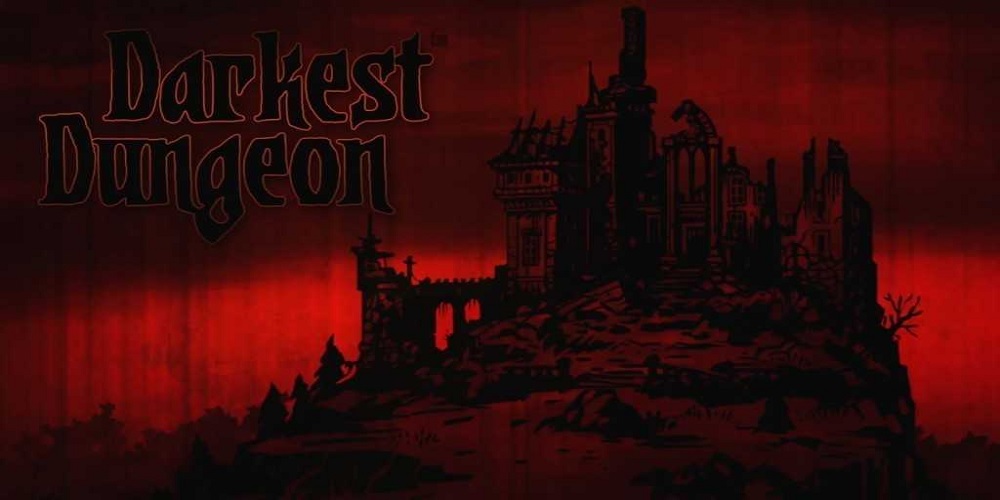
After a lot of time with the game, I’m quite fond of Darkest Dungeon though its hands down one of the most challenging games I’ve ever played. It would be near-perfect if it weren’t a virtual embodiment of a developer’s hatred for player agency, so often are the seemingly unfair deaths and occurrences. It’s the kind of game that will routinely step on your delicate bits and then giggle as you writhe and groan beneath its boot heel, then expect you to carry on regardless. As the narrator himself says, “Clumsiness will find no clemency in this place,” and neither will those with terrible luck. I was absolutely clementless, throughout. It has its problems, but I feel they can be improved, or fixed outright, with post-release patching, and I still thoroughly enjoyed my time with it.

There are riches to be found in this ominous place. Riches, and many rage quits.
From the family manor, perched atop a beach cliff, looming ominously over the Hamlet and surrounding countryside, your recently departed relative has uncovered something terrible. (The relative remains nameless throughout the game, so from here on out I’ll be referring to him as “Dead Pappy.”) Beneath the mortar, stone and wood that make up the imposing facade of the manor, Dead Pappy dug twisted, shadowy tunnels that burrowed their way into the place between realities. In that wretched hole he found a power so immense, so foul, that he could do naught but flee from the unspeakable horrors that he witnessed… and unleashed. Taking a coward’s exit with angry villagers bashing down his door, Pappy’s last act was to send a letter to you, his descendant, pleading that you return to the ancestral home. Your grisly task, whether you desire it or not, is to lead a merry band of mercenaries, vagabonds, and ne’er-do-well’s in putting a final end to the monstrous results of his dark works.
The story of Darkest Dungeon doesn’t directly engage the player most of the time, often taking the role of passive background narrative for the player to enjoy or ignore as they will. You’re not writing the tale either, for the most part; your part in this is something of a final chapter in Dead Pappy’s gloomy tale. As you trudge through the missions you’re privy to the monologues and commentary of Dead Pappy’s ghost, creepily hanging about to fill you in on why it’s so depressing around the place. It creates the kind of atmosphere that a game like this needs, one of dread and desperation while stuck in a place where the hostility is palpable and SWEET JESUS WHAT IS THAT?
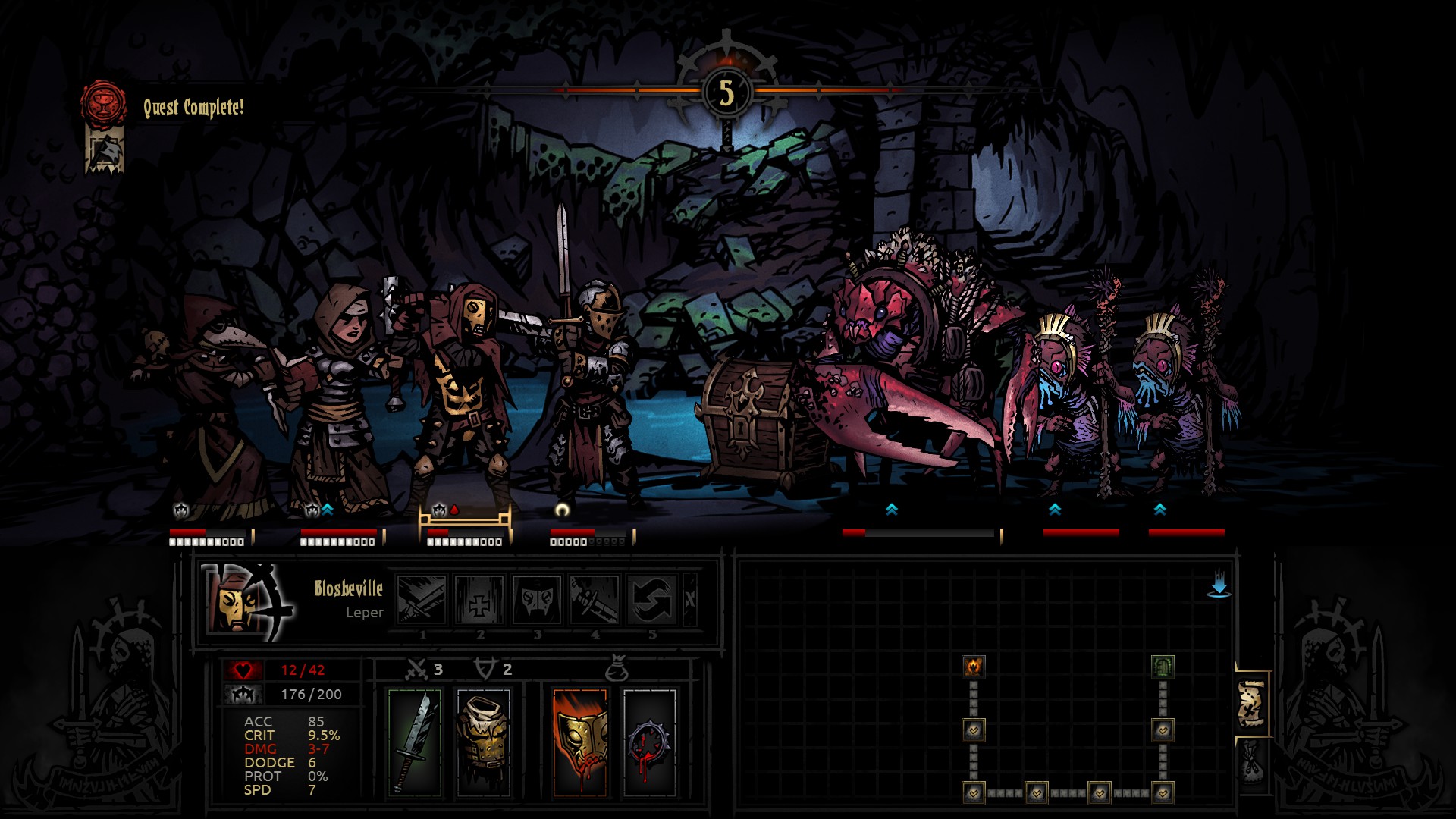
“Hey guys, name’s Fred – Fred the Raping Beast-Man. Don’t worry, it’s only a name – I’m not even humanoid.”
The Lovecraftian references are fairly obvious, what with the game dripping in Eldritch horror and all (sometimes literally.) It’s never obnoxious, and the creators have foregone the seemingly obligatory inclusion of Cthulhu in any piece of media remotely related, or even vaguely similar to Lovecraft’s. What’s present isn’t obnoxious and folds in well with the rest of the narrative, which – while perhaps not entirely original – is still thoroughly enjoyable, and satisfyingly grim. It’s not often that I say this, but I’m okay with the relative lack of driving plot in this game. If anything, Darkest Dungeon is a fantastic homage to ol’ H.P.’s works around the Cthulhu mythos and works as a great framing device for the gameplay.
Where Darkest Dungeon performs best is in its gameplay and design, though it can be brutally harsh and kind of unfair. Creating a roster from the heroes that roll into town between each mission, you control groups of four at a time and guide them through maze-like sections of the countryside. Each mission has a completion objective though it’s far from guaranteed that you’ll reach it. Characters become stressed over time, and the human body can only take so much of that. Madness, at first, later a heart-attack that will leave you at death’s door. Retreat is occasionally essential, death inevitable and permanent. Your survival is highly dependent on how you combine and use your heroes, with each having a particular use and tactical edge.
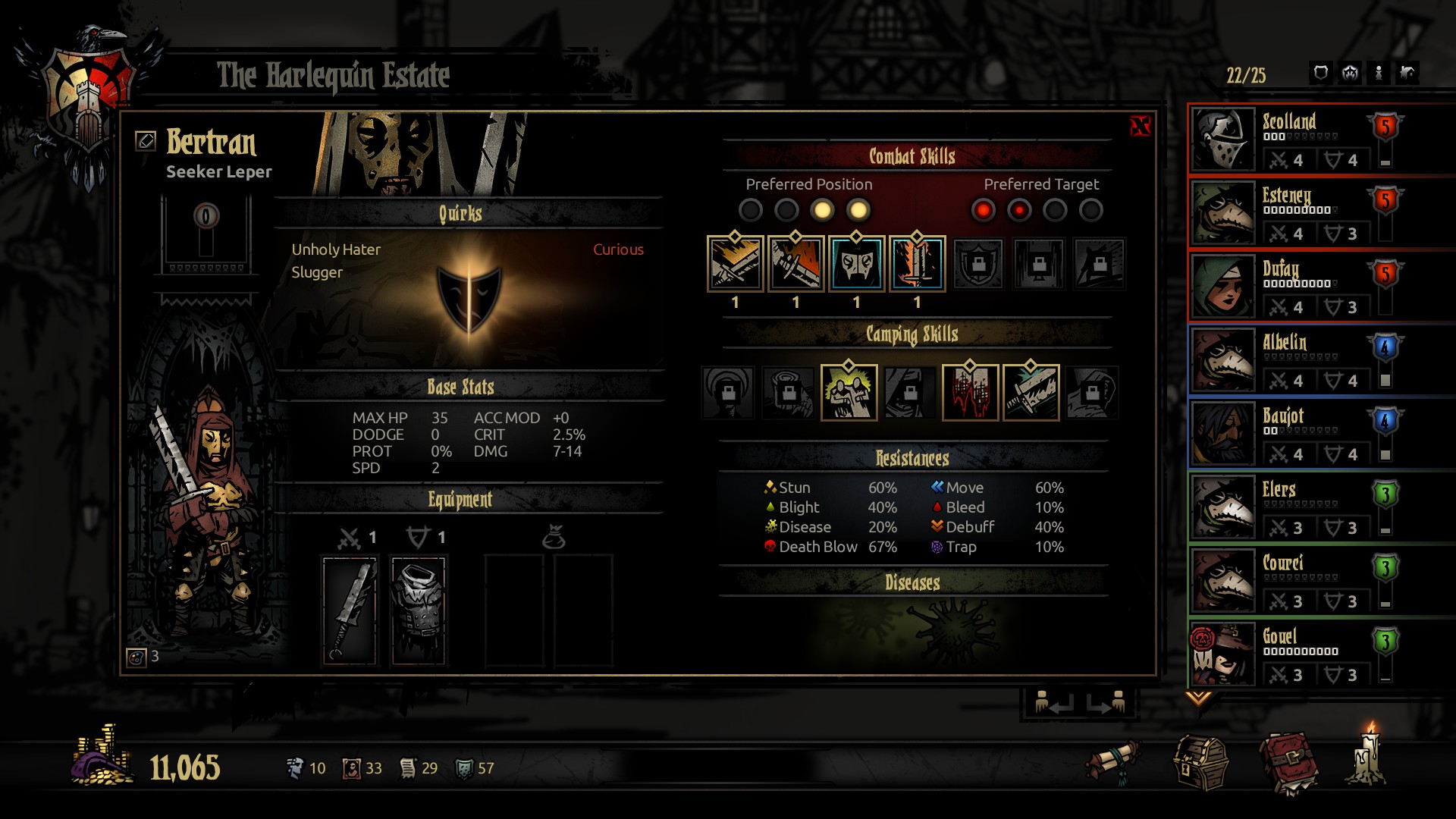
All except the Leper, that guy’s the worst.
The game’s design also doesn’t necessarily fall into the trap of “extremely hard for the sake of being hard,” though it can certainly be exceedingly difficult at times. The brightness of the torch corresponds directly to the level’s difficulty; the darker it gets, the more challenging things become. Conversely, the chance of loot increases significantly the darker it gets and so the game becomes a test of player’s willingness to gamble in a high-stakes risk-vs-reward death-match. While the arduous and demanding nature of Darkest Dungeon had me clinging to the light for dear life at the beginning, I was continually venturing into the darkness for riches by the end. Doing so is almost essential to progressing, if not made an inviting temptation by the overall design.
Darkest Dungeon can be overwhelming to new players; there’s a lot of information being thrown at you right from the get-go, and a lot of it is going to go right over your head. You’ve got to keep track of your torch brightness, your characters’ mental status, their afflictions, their quirks, what abilities are useful where – to name a few things. The game explains only so much at the beginning and provides precious little support information throughout, making learning as you play difficult when you’re just trying to survive. This problem extends to a lot of areas of the design, but I think it’s most apparent in the order of combat initiative. I believe your SPD stat is important in deciding the order of combat initiative, but aside from that, I’m just guessing – hell, I can’t even be sure of that, the game never tells you.
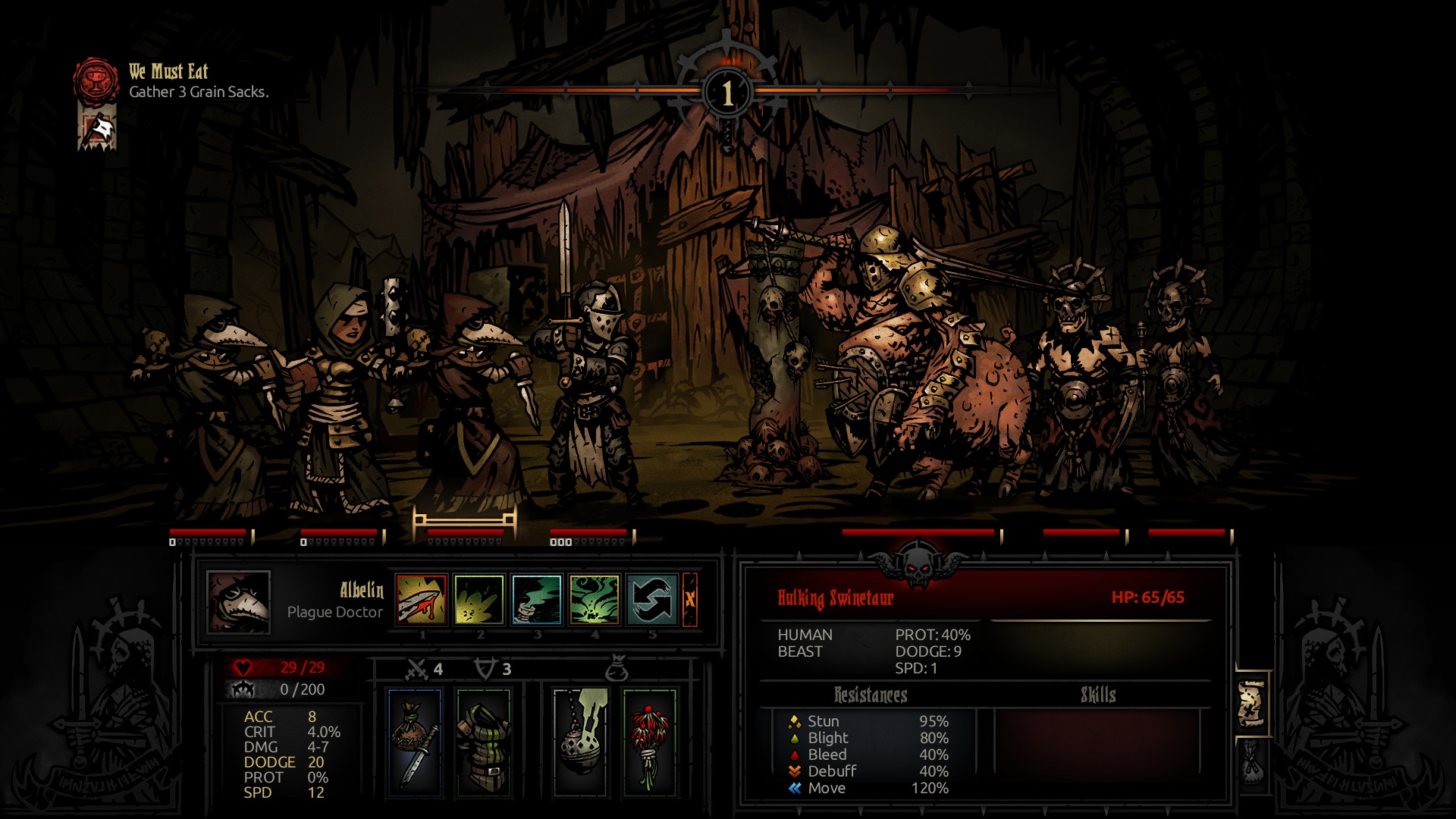
“Okay, so it’ll go me, the cultist dude, the witch lady, my lance, me again, and then if you’re alive you can have a shot.”
Sometimes it might be something as innocuous as accruing a bit of stress while walking down a corridor and having no idea why it happened. Your torch is fully lit, the character wasn’t afflicted at all, but they’re still freaking out bit by bit and there’s nothing to tell you why it’s happening. It’s fine if you don’t want to explain every in-game formula to your players, so you know what would be great in situations like these? Anything that clearly communicates what’s going on to the player. An Action-Queue in combat, so I know who will be going next based on the current stats. Or a little or symbol that appears beside my characters stress meter when it increases, showing me what’s causing it to happen and allowing me to compensate accordingly. That way I can plan a little better in what is otherwise a very in-depth, turn-based RPG, because right now it feels like I’m frequently being punished for not being psychic.
If you stick with it though, perhaps consult a wiki now and again, the experience can be very rewarding. There are fourteen classes that you can hire into your roster and half the fun is in learning how they work together. Small quirks like religious characters refusing to adventure with Abominations are added challenges when considering the best team for a certain quest, and really add personality to the game. You become attached to characters, or at least become attached to their usefulness, and losing one can be legitimately stressful. Venturing into the darkness bears many riches that you can use to upgrade the Hamlet’s buildings and your heroes, which allows you to go on more adventures. This is a game that has the cycle of reward for gameplay being more gameplay down pat.
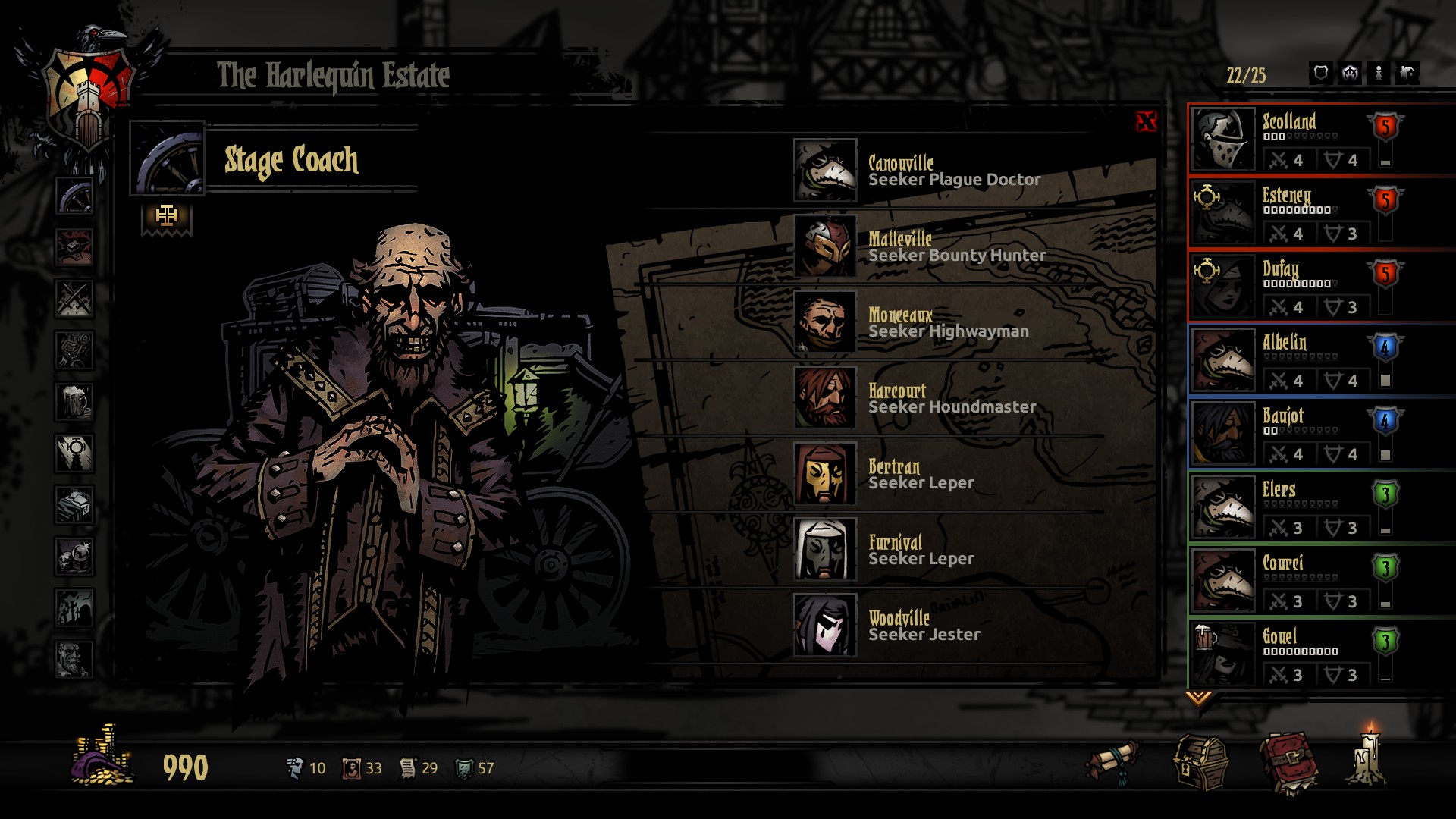
“Right, three of the last lot died and my Plague Doctor now has the plague. Who wants to go next?
My experience has been that the game is technically sound, with just a single crash and a couple of visual glitches across a xx-hour play time. One crash is pretty good. However, it occurred immediately after provisioning my crew. The game shut down and, upon restarting, I found that the treasure I had spent was still gone; after the intended trials and tribulations of the game, it felt just a tad unfair. Visual glitches manifested as targeting icons not quite landing on characters or monsters accurately, or objects occasionally not highlighting when walking over or near them. These are all minor issues, however, and happened so infrequently that I’d hardly call them game-breaking. More of a slight annoyance that haunted my playthrough.
Darkest Dungeon has an in-game appearance reminiscent of old school dungeon crawlers videogames, and a visual style the feels like a D&D handbook’s illustrations come to life. The bulk of the gameplay occurs inside a strip that fills a little over half the screen and consists entirely of a side-scrolling dungeon crawl. Battles occur on the same screen and exploring consists of walking either backwards of forwards down corridors, navigating by a small grid-map in the bottom right of the HUD. The HUD design is fantastic, with the map sharing space with your inventory and switching between the two being as easy as a button press. This limited ability to explore the world has allowed for some incredible artwork; the backgrounds are all hideously detailed, and there’s a lot of variety in enemy appearances.
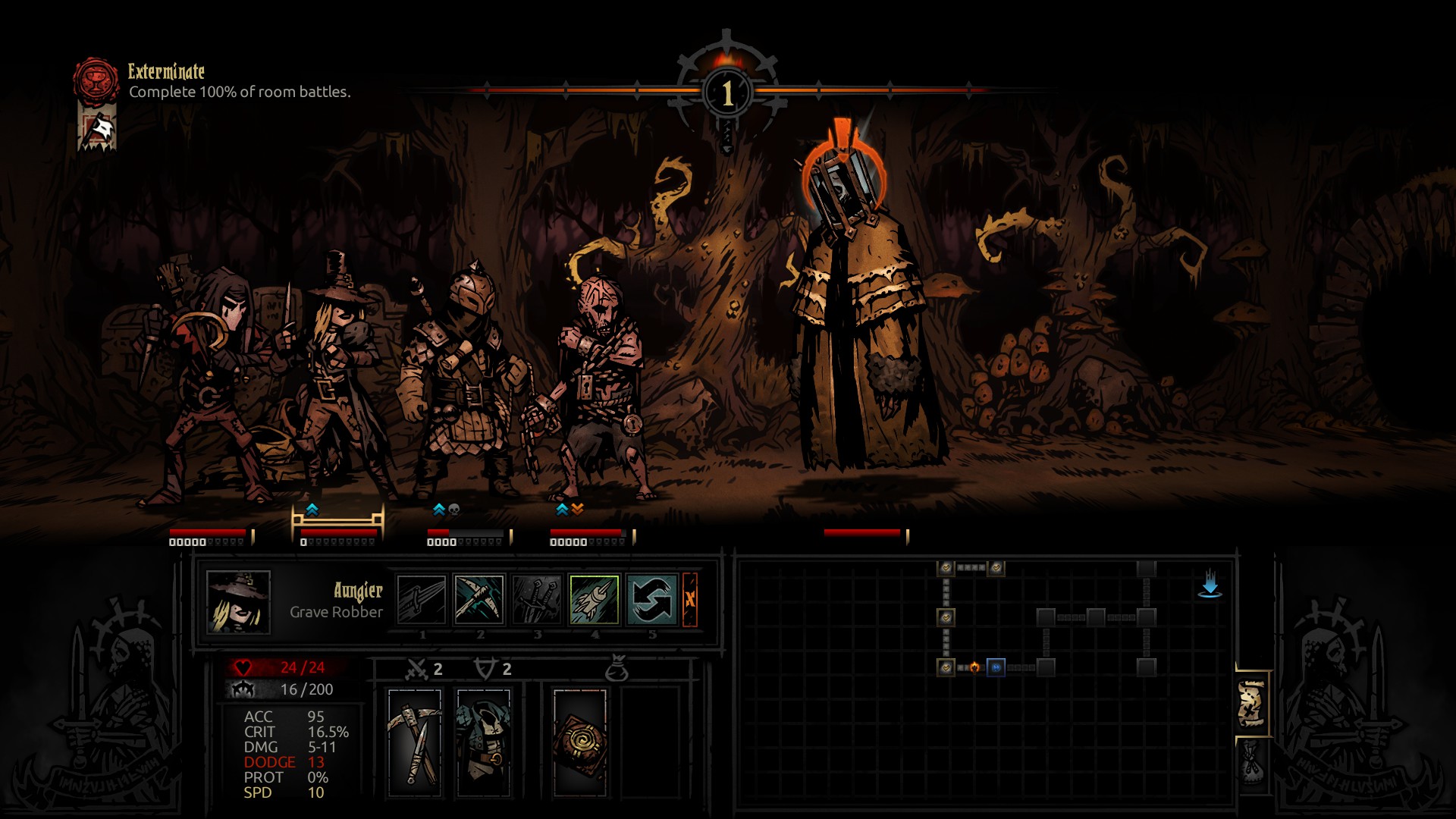
HELLO HUMANS. BOY, DO I HAVE SOMETHING TO SHOW YOU.
The soundtrack is suitably eerie and gothic though I personally don’t feel like it’s anything to rave about. However, the sound direction is excellent, particularly when it comes to the ambient noise in each of the five areas. Each time the torch loses brightness the noise and chaos around you grows louder until you’re in near total darkness with Lord knows what screeching from the shadows. Combat has also received this same level of attention. Holy attacks have a satisfyingly divine ding, occult assaults howl from the abyss, and weapons of all kinds sink into flesh with wet, squishy thuds. Not content to just look the part, Darkest Dungeon wants the visceral details to be almost tangible in their presentation.
The voice acting from Dead Pappy, the Narrator, is grim and haunting, which is fitting given that you’re listening to the rantings of a dead man. He describes his past and the world around you with sordid detail but never goes on too long, providing just enough to fuel your imagination and leaving you wanting (but in a good way.) It’s the only voiced dialogue that you’ll hear throughout the game, from the prologue to the battle commentary, or just depressing the shit out of you while you kick around the Hamlet. The only downside to the narrator’s presentation is that the subtitles often don’t match up with the audio.
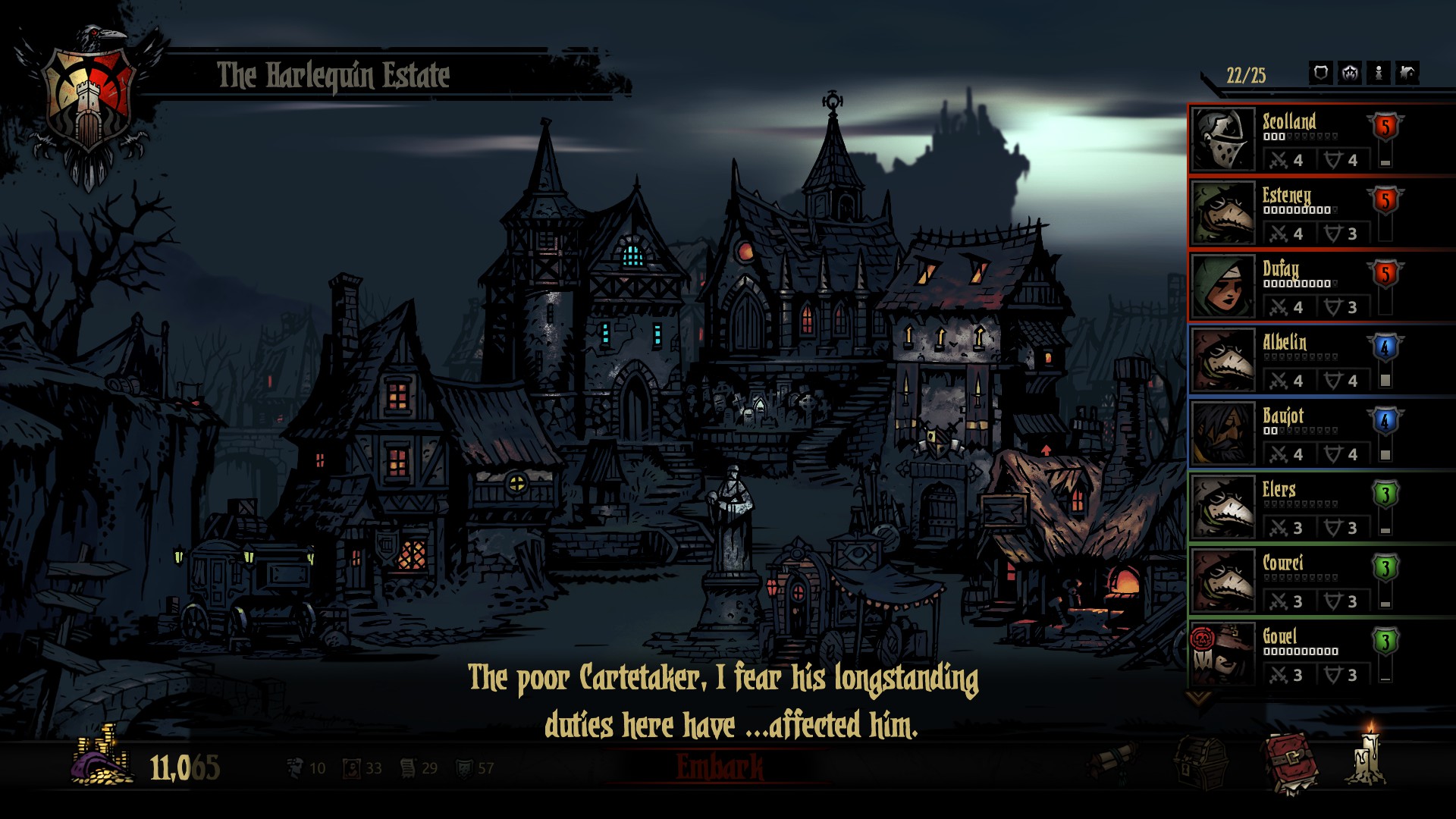
“In time, I’ll recall to you the tragic extent of my failings, over and over…”
Whether intentional or not, there’s also a dark humor to it all; I lost count of the number of times my character would mutter “Better than a trap,” seconds before setting off a trap. I love the sound of narrators voice, as well. It’s like someone got Don LaFontaine and the Council Leader from XCOM to have a love child, and then raised it purely on Saturday Morning Lovecraft. His exclamations during battle can be comical in their joviality or dourness, often over-dramatising the smallest of events. I could be knocking about a small spider with a critical hit and he’ll act like I’m defeating Satan himself – it’s fantastic, and his presence really made the game for me.
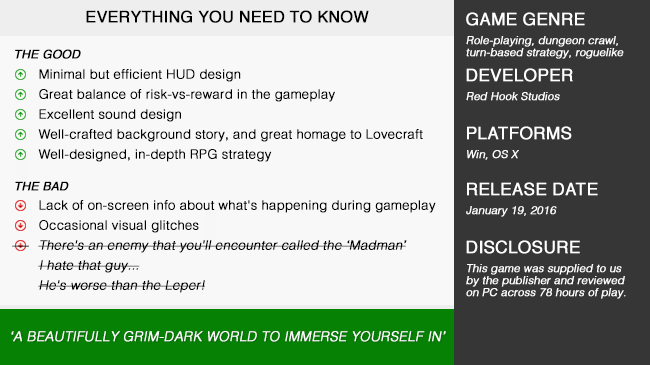
I knew Darkest Dungeon was hard going into the review; it has something of a reputation for being exactly that, but I wasn’t expecting it to be hard largely due to a lack of information. The gameplay will absolutely suck you in once you get a hang of the strategy involved, and deliberately throwing yourself into danger can be a grand ol’ time when you know what you’re doing. Reaching that point is like scaling a difficulty cliff, however, and the game will still try to keep you in the dark – both figuratively and literally. The problems it does have are fixable, however, and the developers look like they’ll be providing post-release support for at least awhile. When not stomping on your face repeatedly with the denizens of hell, Darkest Dungeon is a beautifully grisly, grim-dark world for you to immerse yourself in (if that’s your kind of thing.) If you’re into turn-based RPGs, or rogue-lite dungeon crawlers with a retro-vibe, this is definitely worth checking out.











